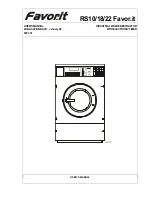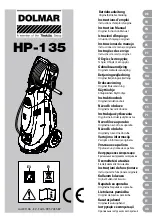
11
English
EN
3.4.2
Connection to the mains water supply
The appliance can be connected directly to the mains
drinking water supply only if the supply hose is fitted with
a backflow preventer valve as per current regulations in
force. Make sure that the hose is at least Ø 13 mm and
that it is reinforced.
4
ADJUSTMENT INFORMATION FIG.3
4.1
Adjusting the spray nozzle
(for models with this feature)
Water flow is adjusted by regulating the nozzle (
E
).
4.2
Adjusting the detergent
(on models with this feature)
Detergent flow is adjusted using the regulator (
F
).
4.3
Adjusting the detergent pressure
Set the adjustable nozzle (
E
) on " " to deliver detergent at the
correct pressure (on models with this feature).
4.4
Adjusting the pressure
(on models with this feature)
The regulator (
G
) is used to adjust the working pressure. The pres-
sure is shown on the pressure gauge (where fitted).
5
INFORMATION ON USE OF THE APPLIANCE FIG.4
5.1 Controls
- Starter device (
H
).
Set the starter switch on (ON/1) to:
a) start the motor (in models without TSS device);
b) set the motor ready to start (in models with TSS device).
If there is a pilot light on the starter device, it should light up.
If the “low/high” settings are available, use them as follows:
Low : low pressure washing
High : high pressure washing
Set the starter device switch on (OFF/0) to shut down the applian-
ce.
If there is a pilot light on the starter device, it should go out.
- Water jet control lever (
I
).
Caution - Danger!
During operation the appliance must be positioned
as shown in fig. 4 on a sturdy, stable surface.
5.2 Start-up
1) Turn on the water supply tap fully.
2) Release the safety catch (
D
).
3) Depress the gun trigger for a few seconds and start up the appli-
ance using the starter device (ON/1).
Caution - Danger!
Before starting up the appliance check that the water
supply hose is connected properly; use of the appliance
without water will damage it; do not cover the ventilation
grilles when the appliance is in use.
TSS
models - In TSS models with automatic delivery flow cut-off
system:
- when the gun trigger is
released
the dynamic pressure automati-
cally cuts out the motor (see fig.4);
- when the gun trigger is
depressed
the automatic drop in pres-
sure starts the motor and the pressure is restored after a very
slight delay;
- if the TSS is to function correctly all gun
releasing
and
depress-
ing
operations must be performed at intervals of
less
than 4-5
seconds.
On three-phase models
for professional use
, at first use start the
appliance for a very short time to check that the motor is running
in the correct direction. If the motor fan is turning anti-clockwise,
exchange two of the three phase wires (L1, L2, L3) in the electri-
cal plug.
To prevent damage to the appliance, do not allow it to oper-
ate dry and when running do not stop the water jet for more
than 10 minutes at a time (for models without TSS device).
5.3
Stopping the appliance
1) Set the starter device switch on (OFF/0).
2) Depress the gun trigger and discharge the residual pressure
inside the hoses.
3) Engage the gun safety catch (
D
).
5.4 Restarting
1) Release the safety catch (
D
).
2) Depress the gun trigger and discharge the residual air inside
the hoses.
3) Set the starter device on (ON/1).
5.5 Storage
1) Switch the appliance off (OFF/0).
2) Remove the plug from the socket.
3) Turn off the water supply tap.
4) Discharge the residual pressure from the gun until all the water
has come out of the nozzle.
5) Drain and wash out the detergent tank at the end of the work-
ing session. To wash out the tank, use clean water instead of
the detergent.
6) Engage the gun safety catch (D).
5.6
Refilling and using detergent
When using detergent, the adjustable nozzle must be set on
" " (on models with this feature).
Use of a high pressure hose longer than the one originally supplied
with the cleaner, or the use of an additional hose extension, may
reduce or completely halt the intake of detergent.
Fill the tank with highly degradable detergent.
5.7
Recommended cleaning procedure
Dissolve dirt by applying the detergent mixed with water to the
surface while still dry.
When dealing with vertical surfaces work from the bottom upwards.
Leave the detergent to act for 1-2 minutes but do not allow the
surface to dry. Starting from the bottom, use the high pressure jet
at a minimum distance of 30 cm. Do not allow the rinse water to run
onto unwashed surfaces.
In some cases, scrubbing with brushes is needed to remove dirt.
High pressure is not always the best solution for good washing
results, since it may damage some surfaces. The finest adjustable
nozzle jet setting or the rotating nozzle nozzle should not be used
on delicate or painted parts, or on pressurised components (e.g
tyres, inflation valves, etc.).
Effective washing depends on both the pressure and volume of the
water used, to the same degree.
6
MAINTENANCE FIG.5
Any maintenance operations not covered by this chapter should be
carried out by an Authorized Sales and Service Centre.
Caution - Danger!
Always disconnect the plug from the power socket
before carrying out any work on the appliance.
6.1
Cleaning the nozzle
1) Disconnect the lance from the nozzle.
2) Remove any dirt deposits from the nozzle hole using the tool
(
C1
).
6.2
Cleaning the filter
Inspect the intake filter (
L
) and detergent filter (if fitted) before each
use, and clean in accordance with the instructions if necessary.
6.3
Unjamming the motor
(on models with this feature)
In case of lengthy stoppages, limescale sediments may cause the
motor to seize. To unjam the motor, turn the drive shaft with a
tool (
M
).
6.4 End-of-season
storage
Treat the appliance with non-corrosive, non-toxic antifreeze before
storing it away for winter.
Put the appliance in a dry place, protected from frost.


































